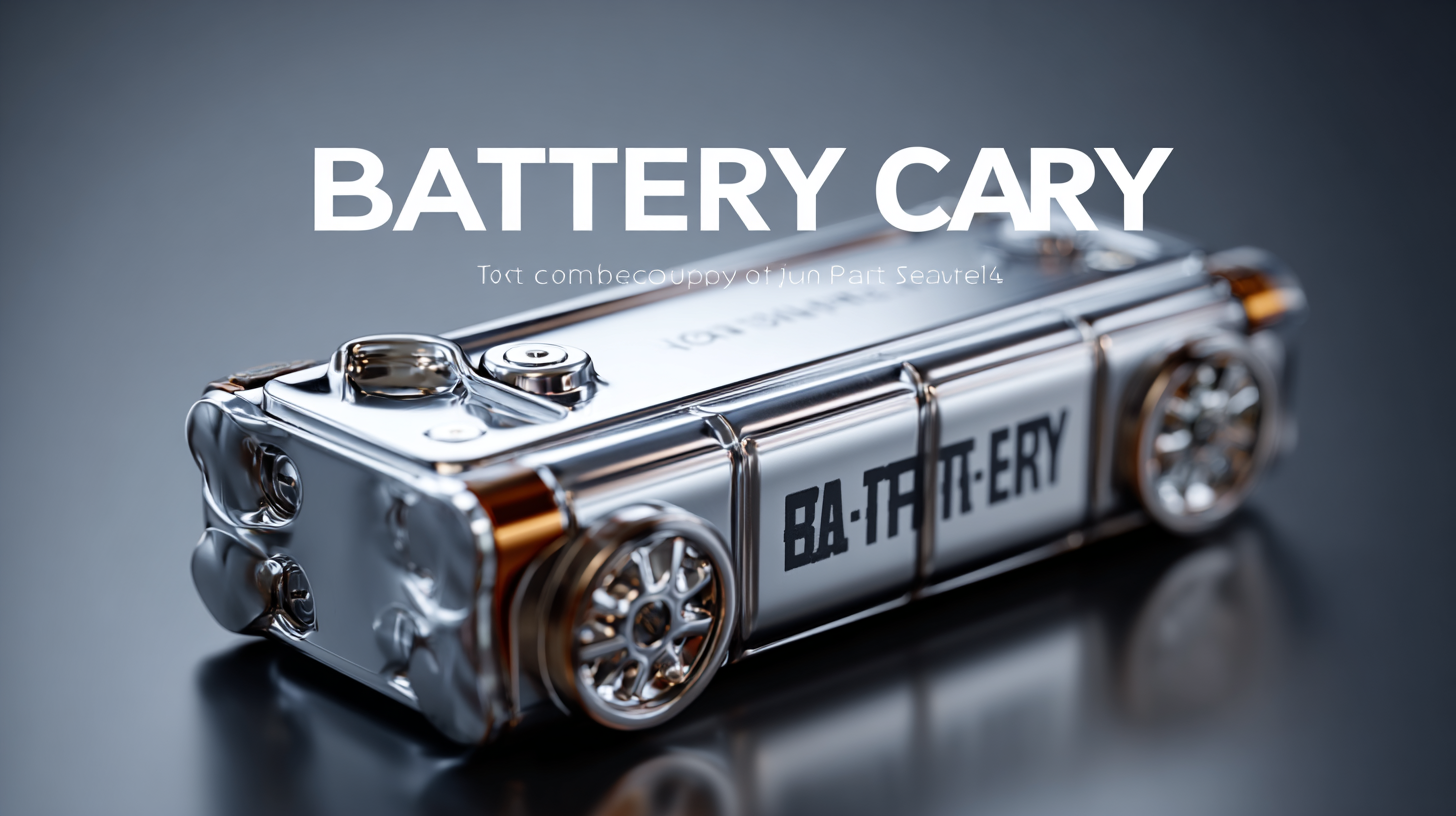Leave Your Message
As the automotive industry rapidly shifts towards sustainability, the demand for Battery Cars is surging. According to a recent report by the International Energy Agency (IEA), the global electric vehicle (EV) stock surpassed 10 million units in 2020, with Battery Cars making up a significant portion of this figure. The transition to electric mobility is not just a trend; it represents a fundamental change in how we think about transportation, influenced by factors such as government regulations, consumer preferences, and advancements in battery technology. With numerous manufacturers entering the market, choosing the right Battery Car that aligns with your needs can be daunting. Understanding the differences between types, performance specifications, and overall value is crucial in making an informed decision. This guide aims to provide you with a comprehensive overview that will help you navigate the diverse landscape of Battery Cars, ensuring you find the perfect fit for your lifestyle and driving habits.

When it comes to choosing the right battery car, understanding the various types available is essential. Battery electric vehicles (BEVs) are the most common option, entirely powered by electric batteries. They offer zero emissions and can provide significant savings on fuel and maintenance costs. Examples include the popular Tesla Model 3 and the Nissan Leaf. BEVs are ideal for those who have access to charging infrastructure and can handle the range offered by these vehicles.
Another category to consider is plug-in hybrid electric vehicles (PHEVs), which combine an internal combustion engine with an electric motor. This dual approach offers the flexibility to switch between electricity and gasoline, making them suitable for longer trips where charging stations may be scarce. For instance, the Toyota Prius Prime serves as a great model in this category, allowing drivers to enjoy the benefits of electric driving with the security of a gasoline backup. Understanding these different types will help you navigate the options more effectively and choose the right battery car that fits your lifestyle and driving needs.
When selecting the best battery car for your lifestyle, there are several key factors to consider. First, assess your driving habits. If you have a long daily commute, look for a model with a higher range to avoid frequent charging stops. Conversely, if your driving needs are more sporadic and short-distance, a smaller battery capacity might suffice, allowing for cost savings.
Another essential consideration is the type of charging available to you. If you can install a home charging station, you can opt for electric vehicles (EVs) with larger batteries as you can easily charge overnight. Conversely, if you rely on public charging stations, ensure that your chosen car is compatible with the available infrastructure, especially in your area.
Tips: When comparing models, always check the manufacturer’s warranty on the battery. This can provide peace of mind regarding potential battery degradation over time. Additionally, consider test-driving various options to gauge comfort and handling. Remember, the right battery car should not only meet your practical needs but also enhance your driving experience and fit your personal preferences.
When choosing the best battery car, understanding battery life and charging options is essential. Recent studies indicate that the average range for electric vehicles (EVs) is steadily improving, with leading models now exceeding 300 miles on a single charge. According to a 2022 report by the International Energy Agency, the global EV stock reached over 16 million, highlighting a growing trust in battery technology. Consumers are increasingly prioritizing battery longevity, with many drivers seeking vehicles that not only offer decent range but also retain 70% of their capacity after 8 years of use.

Tip: Always consider a car's battery warranty. Many manufacturers offer warranties that last up to 8 years, ensuring that you won’t face potential replacement costs too soon.
Charging options also play a critical role in the decision-making process. Fast charging stations are becoming more ubiquitous, with approximately 30,000 public charging points available in the U.S. as of 2023, making long-distance travel more feasible than ever. It's crucial to factor in the charging infrastructure in your area when choosing a battery car.
Tip: Look for models with varied charging capabilities, such as Level 2 home chargers and compatibility with DC fast chargers, which allow for rapid charging in about 30 minutes. This versatility can greatly enhance your driving experience and convenience.
When it comes to choosing the best battery car for your needs, assessing performance and range is paramount. Performance encompasses acceleration, handling, and overall driving experience, while range addresses how far a vehicle can travel on a single charge. Striking the right balance between these factors ensures that your car meets your daily demands without compromising on efficiency or enjoyment.
**Tip 1:** Before making a decision, evaluate your daily driving habits. If you primarily use your car for commuting short distances, a vehicle with a slightly lower range could suffice, saving you money. However, if road trips or long commutes are on your agenda, prioritize models with extended range capabilities to avoid frequent charging interruptions.
**Tip 2:** Don't overlook the importance of charging infrastructure. Investigate the availability of charging stations in your area and on any regular routes. This will enhance your overall experience and ensure that you have convenient access to power, particularly if you opt for a model with less range.
By carefully considering performance and range alongside your lifestyle needs, you can select a battery car that not only performs well but also fits seamlessly into your daily routine.
| Model | Range (miles) | 0-60 mph (seconds) | Battery Capacity (kWh) | Charging Time (0-100%) |
|---|---|---|---|---|
| Model A | 310 | 4.2 | 75 | 8 hours |
| Model B | 250 | 5.5 | 60 | 6 hours |
| Model C | 400 | 3.5 | 90 | 10 hours |
| Model D | 300 | 6.0 | 80 | 7 hours |
| Model E | 350 | 4.8 | 85 | 9 hours |
When considering the financial aspects of purchasing a battery car, budgeting is crucial. The initial cost can vary significantly based on the make and model, as well as additional features. While some battery cars come with a higher price tag, governments around the world are offering various incentives that can alleviate some of these costs. Tax credits, rebates, and grants can substantially lower the effective price, making the transition to an electric vehicle more feasible for many buyers.

Beyond the purchase price, it's essential to factor in long-term savings associated with battery cars. Electric vehicles typically require less maintenance compared to traditional combustion engines, leading to reduced servicing costs. Moreover, electricity is generally cheaper than gasoline, which can result in significant savings on fuel over time. Additionally, many regions have made investments in charging infrastructure, allowing for easier access to charging stations. By understanding the total cost of ownership, including incentives and potential savings, you can make an informed decision that aligns with your financial goals.
